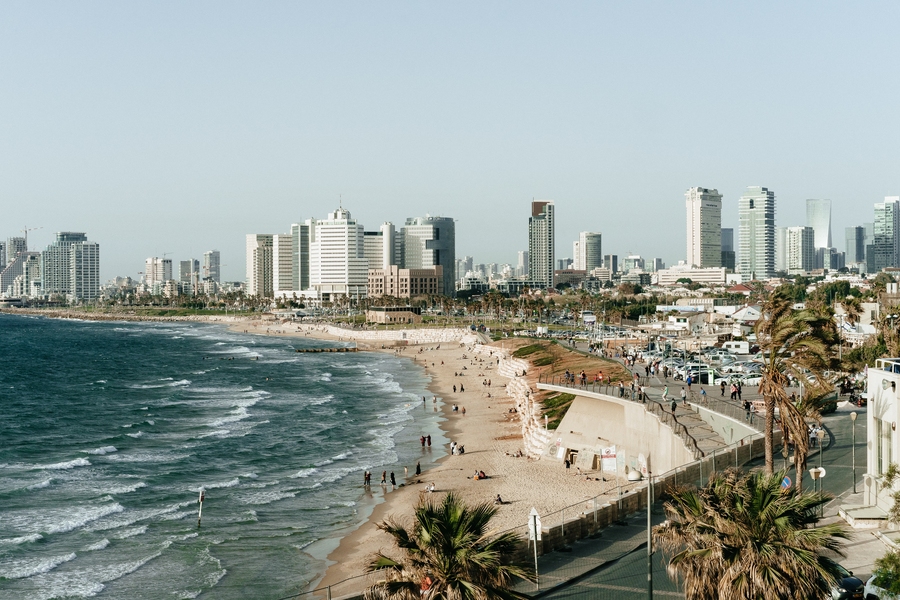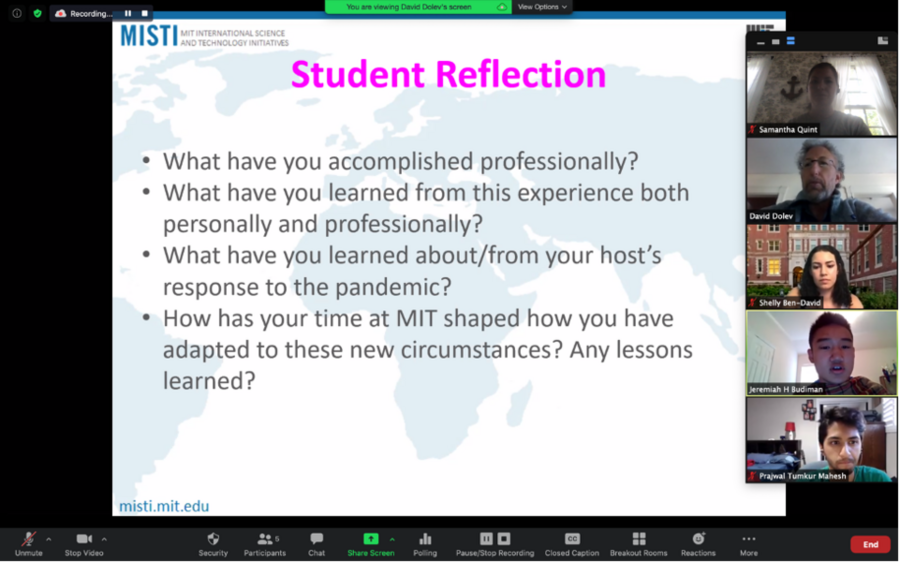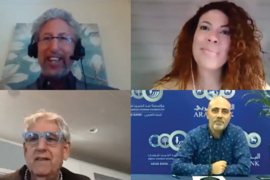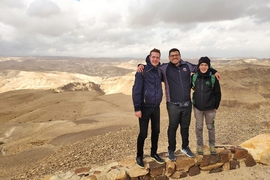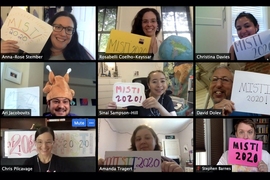"Students' global engagement is a key experience enabling them to grow both in their course of study and in their leadership skills," says MIT-Israel Faculty Director Eran Ben-Joseph. "The Covid-19 pandemic is challenging us all and changed our students' Israel plans."
MIT-Israel is a part of MIT International Science and Technology Initiatives (MISTI), an experiential program that connects MIT to the global community. MISTI provides students and faculty opportunities to participate in research, teaching, and work opportunities worldwide. In a typical year, MIT-Israel sends over 100 students to Israel and supports up to 15 faculty projects, as outlined in their 2019-20 annual report.
When Covid-19 hit, MISTI's MIT-Israel staff brainstormed with colleagues and international partners to reshape programming options and translate opportunities into a virtual format whenever possible. This new direction consisted of remote part-time and full-time internships and teaching opportunities over the summer and fall and online public events. Students were prepared and supported for these experiences with online cultural training and assignments. While much has changed, the program's commitment to enabling MIT students and faculty to experience Israel has not.
"We had to be creative in finding ways to offer, at least to some of the students, a professional Israel-related experience through remote internships," Ben-Joseph shares. "These internships provided a satisfactory solution to both the students and their hosts in Israel. We will continue down this path until we can send students once again to Israel, hopefully in summer 2021."
Travel turned remote
"[The] MIT-Israel experience has granted me valuable and meaningful insights into both my field of academic interest and the Israeli cultural experience at large. Through my interactions with my mentors and teammates, I gained experience in cross-cultural, remote communication," shares civil and environmental engineering sophomore Phoebe Shi.
Shi is one of many MIT students who planned to intern in Israel this summer with the MIT-Israel internship program that typically sends around 50 students each summer. MIT-Israel was able to provide Shi and several other students remote internship experiences with a mix of startup companies and faculty from the Weizmann Institute of Science, University of Haifa, Technion-Israel Institute of Technology, Ben-Gurion University, and Bar-Ilan University in place of in-country internships over summer 2020. Currently, over the Independent Activities Period, there are 15 MIT students taking part in remote internships with Israeli companies and labs.
Sagie Meshulam, vice president of R&D at Serenno Medical, was very impressed with his MISTI intern, senior Maya Levy, a biological engineering student. "Maya has been a great help to us. She is highly motivated, intelligent, and fun to work with. She is working on a scientific tool to analyze our clinical trial's data. The long-distance work is challenging, but Maya manages her tasks and schedule in the most professional way possible. I couldn't be prouder of her quick progress and learning skills."
Training from afar
MISTI programs' foundation is intense cross-cultural preparation to prepare students for experiences in a country usually unfamiliar to them. In response to the pandemic, the MIT-Israel staff worked to convert training typically done in the classroom as a group to an online format. Activities included group Zoom sessions on Israeli culture, reflection on the internship experience, and one-on-one meetings with Israeli MIT students and field leaders in Israel.
"We have multiple aims with the online training," MIT-Israel Managing Director David Dolev explains. "First and foremost is to support the students, both personally and professionally, who are working remotely across the globe, with internship hosts from another culture. The second aim is for students to gain a deeper understanding of Israeli culture for them to be more successful in their internships and develop a stronger connection to their hosts and Israel. And thirdly is to help them as they move through challenges that may arise during the summer."
Supporting faculty collaboration
The pandemic also disrupted MISTI Global Seed Funds (GSF) faculty projects. "We had planned to meet in person in both Rehovot [Israel] and Cambridge [Massachusetts]. Obviously, this is no longer possible," says MIT-Israel Zuckerman STEM Fund awardee Max Price, regarding his collaboration with Professor Christine Ortiz and scientists at the Weizmann Institute of Science. "We have therefore re-imagined the workflow of our collaboration around web-based communication and bringing on additional partners and students to initiate the pilot study in Israel."
To support faculty as they reconfigure their project plans, MISTI is offering to repurpose a portion of the GSF funds for student salaries to help with research progress. The goal is to keep the projects moving while also providing additional opportunities for students. "Being able to support students and their research — especially this past summer, when so many of the other funding sources were overtaxed — is a crucial part of the MIT faculty's mission to provide opportunities for students to develop research skills and expertise," says Price. In September, there was a call for proposals for MIT-Israel Seed Funds, including the launch of a new MIT-Israel Broshy Brain and Cognitive Sciences Fund, MIT-Israel Zuckerman STEM Fund, the MIT-Israel Lockheed Martin Seed Fund.
Focusing on solutions
In addition to restructuring internship and GSF programs, MIT-Israel has provided the MIT community with online forums to learn and engage with Israel. One example was "Israeli Medical Innovation, Coronavirus-Era" with an introduction by MIT-Israel alumna Peniel Argaw. Additionally, "When Culture Meets Covid-19" was a MISTI-wide webinar focused on the Middle East, Asia, and Europe. More recently, "By Air, Land, and Sea: Israeli Insights on Transportation During the Covid-19 Crisis" featured an introduction by MIT-Israel alumna Amy Vogel.
Finally, on Dec. 9, Ada Yonath, 2009 Nobel Prize winner in chemistry, led a candid discussion in the first "MIT-Israel Breaking Boundaries: Israelis in Science, Technology and the Economy" webinar series. This series focuses on Israeli MIT alumni and others who have played, and continue to play, a transformative role in Israeli society. Speakers' personal stories will discuss how MIT influenced them, their professional challenges, what boundaries they feel they have broken through, what tools they used to do so, and advice for MIT students and alumni. The next event in this series will take place on Wednesday, Feb. 24, with Professor Amnon Shashua, founder of Mobileye.
Long-term impact: spotlight on alumni
MISTI programs impact students long after they return to campus, and many alumni state that their experiences have reshaped their career goals and trajectory. Camilla Richman '15, a three-time MIT-Israel participant, founded Hamama Inc. This West Sacramento, California-based startup sells grow kits and patent-pending Seed Quilts for growing microgreens in the home.
Richman became familiar with the word "hamama" (meaning greenhouse in Hebrew) at Kibbutz Ein Shemer, where she was part of the first MIT student group to visit the kibbutz as part of Global Teaching Labs in 2014. As a result of her pioneering trip, she won the MISTI Ambassador of Excellence Award. She returned to Kibbutz Ein Shemer the following year to lead a group of three MIT students and continue teaching the young Israelis Agri phonics, 3D printing, and other environmental topics.
Richman founded Hamama with fellow MIT alum Daniel Goodman, whom she met while working at MIT Media Lab and operating large-scale, indoor, controlled-environment farms that could grow various crops year-round. Their work on the "Food Computer" project, a small-scale version of these farms, got them excited about the potential of indoor agriculture to provide fresh produce year-round on a smaller, hyper-localized scale. Richman recently raised $2 million in funding for the startup, expanding its ability to offer fresh microgreens to homes across the country.
